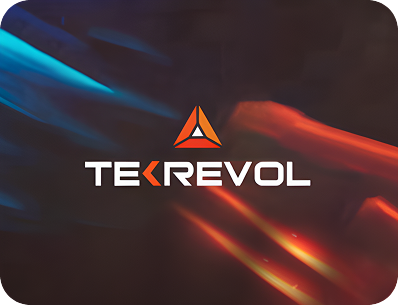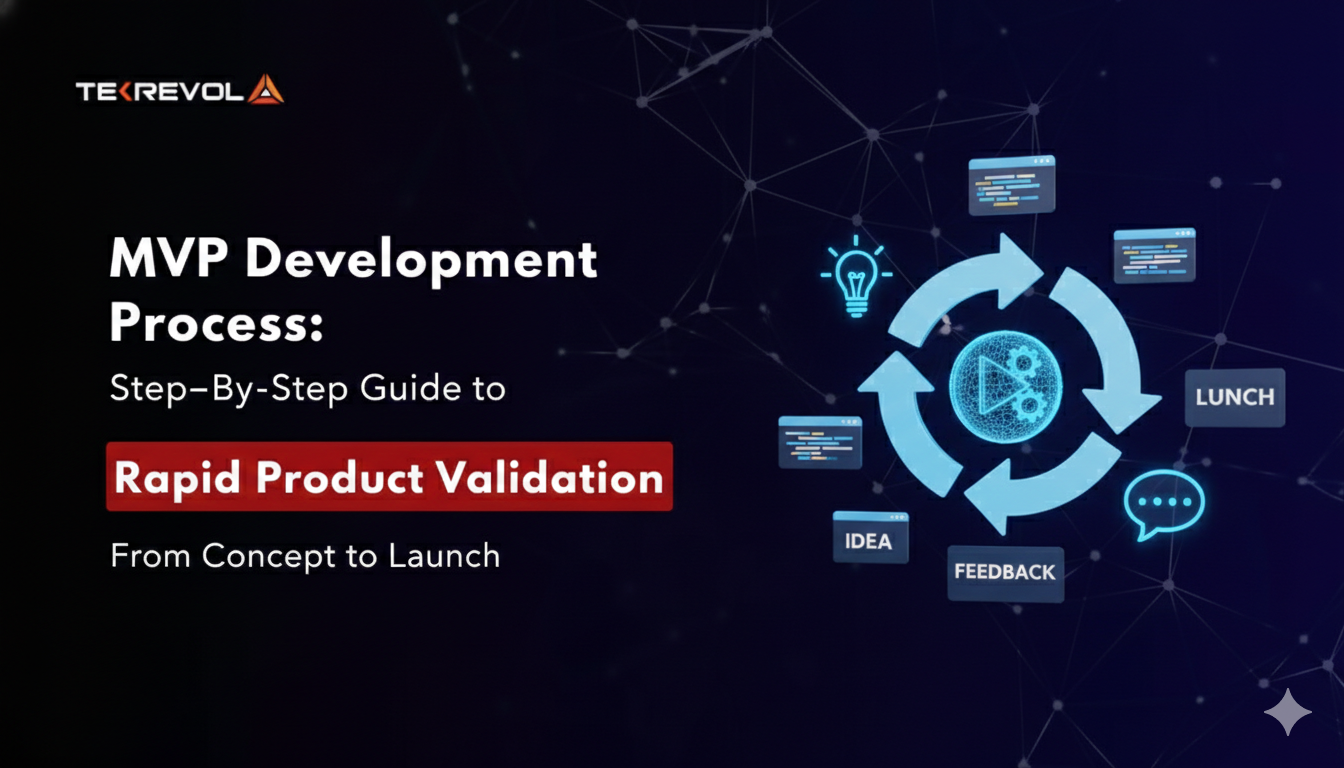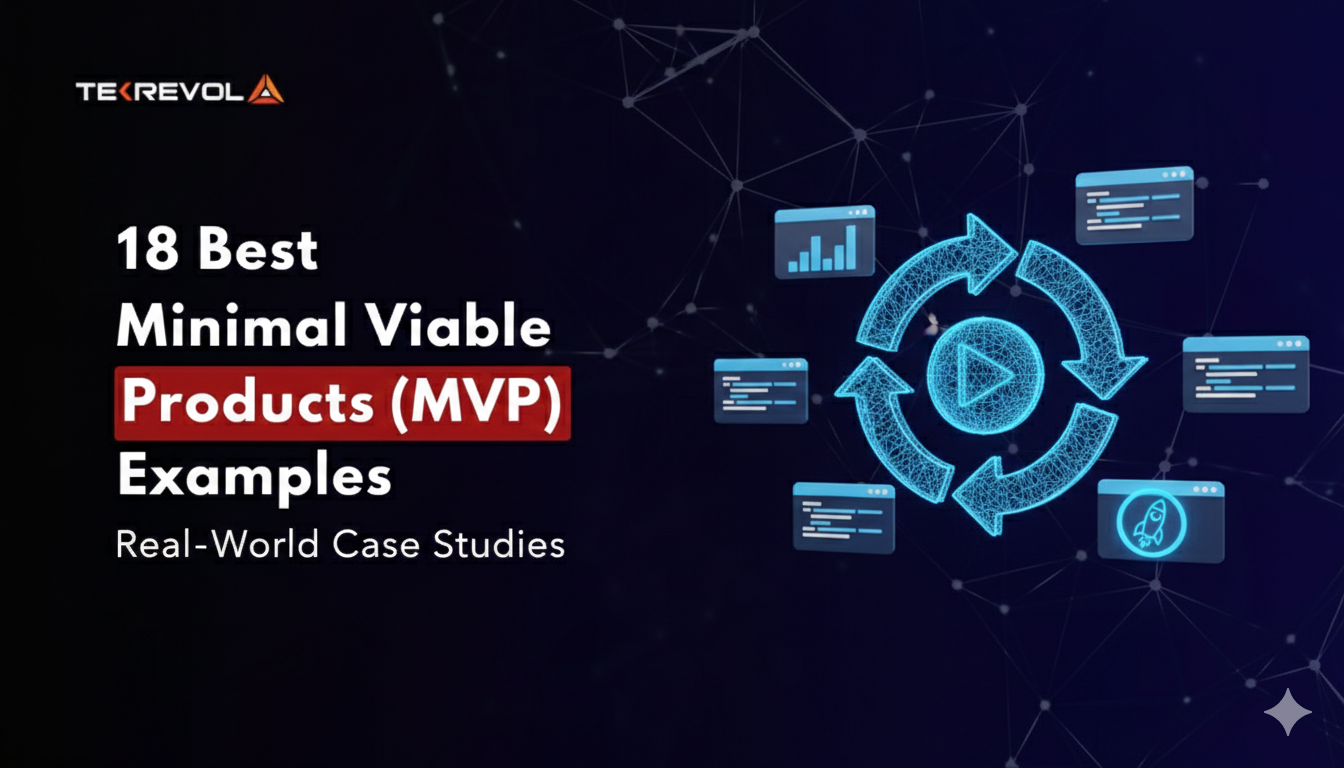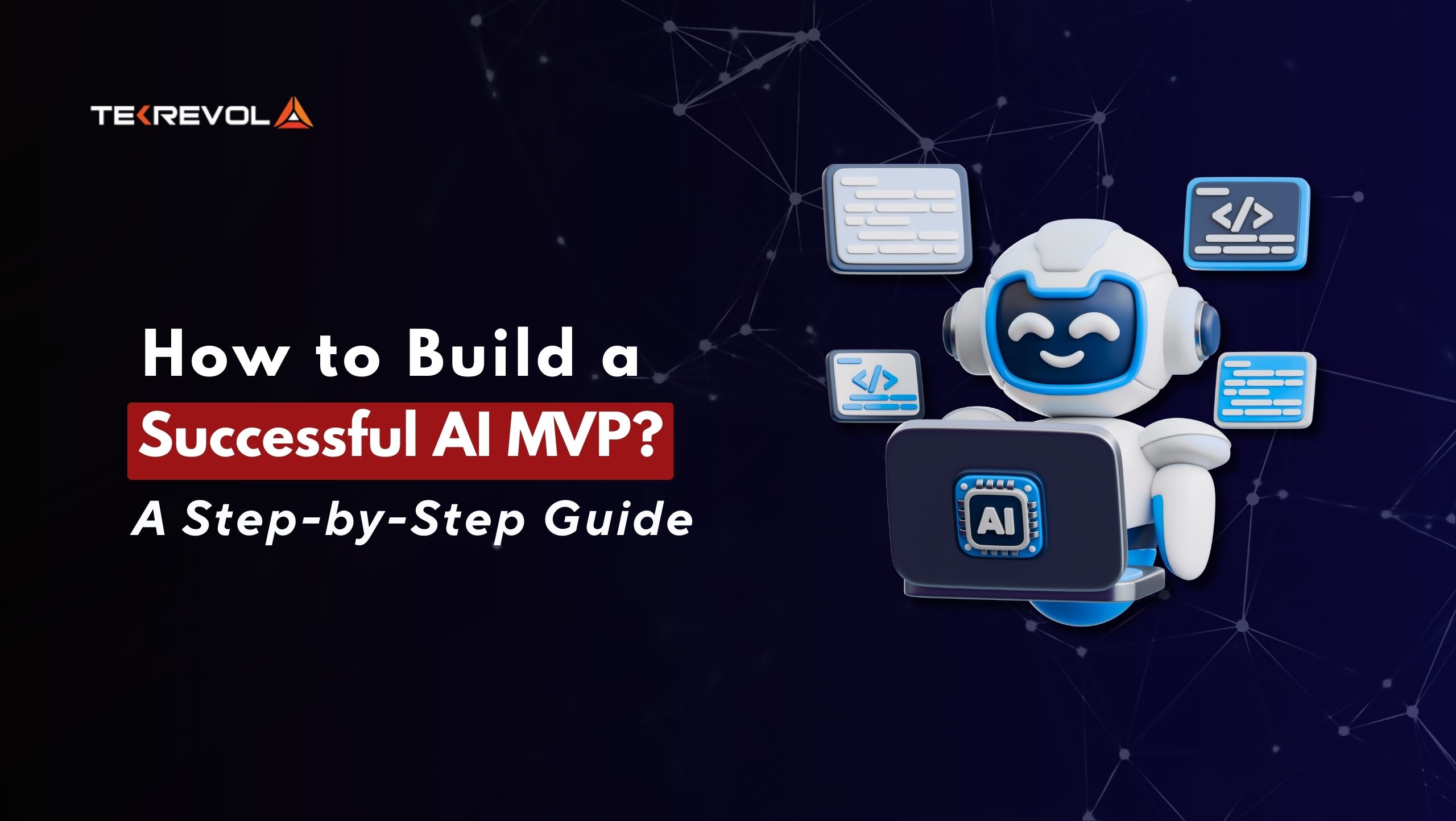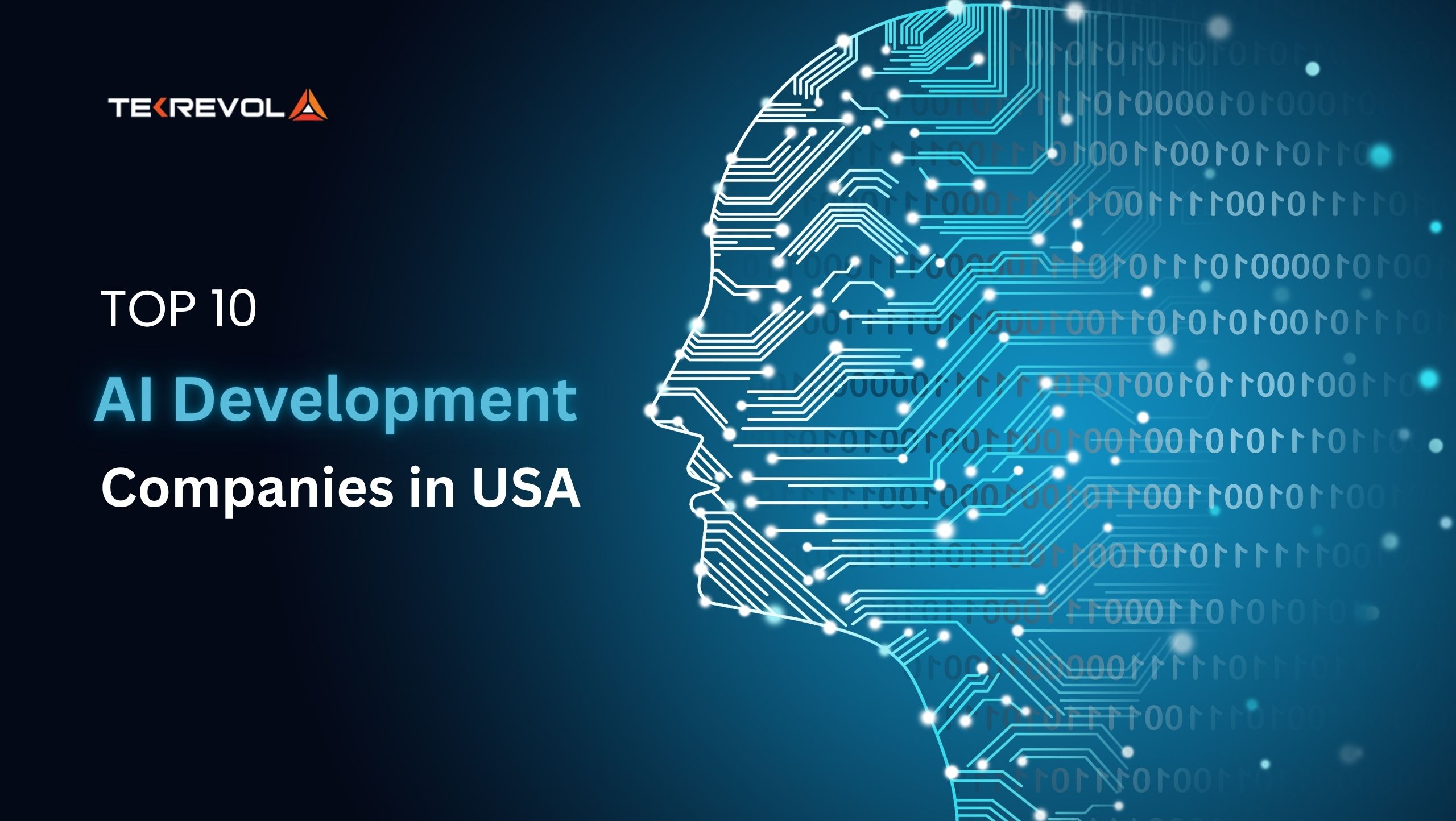Imagine your car as a sort of personal assistant, steering you around a traffic jam, alerting you about maintenance, monitoring the condition of your tires, and even switching up the temperature before you even have to press a button. That is no longer a dream. AI is making this possible. These smart capabilities are coming into reality with AI.
However, the global automotive AI market is estimated to reach USD 18.83 billion in 2025 and USD 38.45 billion in 2030, indicating how fast this change is taking place.
The automotive business is witnessing the impact of AI in every aspect of its operations, including building cars and how individuals drive and communicate with their vehicles.
Nowadays, the leading automotive manufacturers such as BMW and Tesla are incorporating AI into the development of a smart car to provide a high-quality driving experience to all their customers.
But just in case you are still uncertain about how AI can be put into practice in your automotive company, this blog will help you understand how AI has been applied in practice and the benefits of AI in the automotive industry.
AI in the Automobile Industry: Market Insights and Growth Forecasts
The following are some of the key benefits of AI in the automotive industry that can give your business a strong competitive edge:
- In the United States alone, the AI automotive market size is expected to grow from $0.57 billion in 2023 to $5.71 billion by 2033, at a CAGR of 26.6%, reflecting a significant growth trajectory.
- 90% of new vehicles produced globally are expected to incorporate some form of AI technology.
- The U.S. ADAS market reached USD 8.93 billion in 2023 and is projected to expand at a 10.2% CAGR through 2030.
- According to a McKinsey report, predictive maintenance can cut maintenance costs by 10–40%, reduce downtime by up to 50%, and extend equipment life by 20–40%.
- Sales of autonomous vehicles are anticipated to hit 41.34 million units in 2029, soaring further to 58 million units by 2030.
What Role Does AI Play in the Automotive Industry?
Artificial intelligence in automotive is the act of incorporating intelligent systems into vehicles and car operations through the use of machine learning, deep learning, computer vision, and natural language processing.
Smart mobility does not necessarily mean smart cars, but it is the process of making cars safer, faster, and more personal at once, changing the nature of car design and engineering.
Real-World Applications of AI in the Automobile Industry
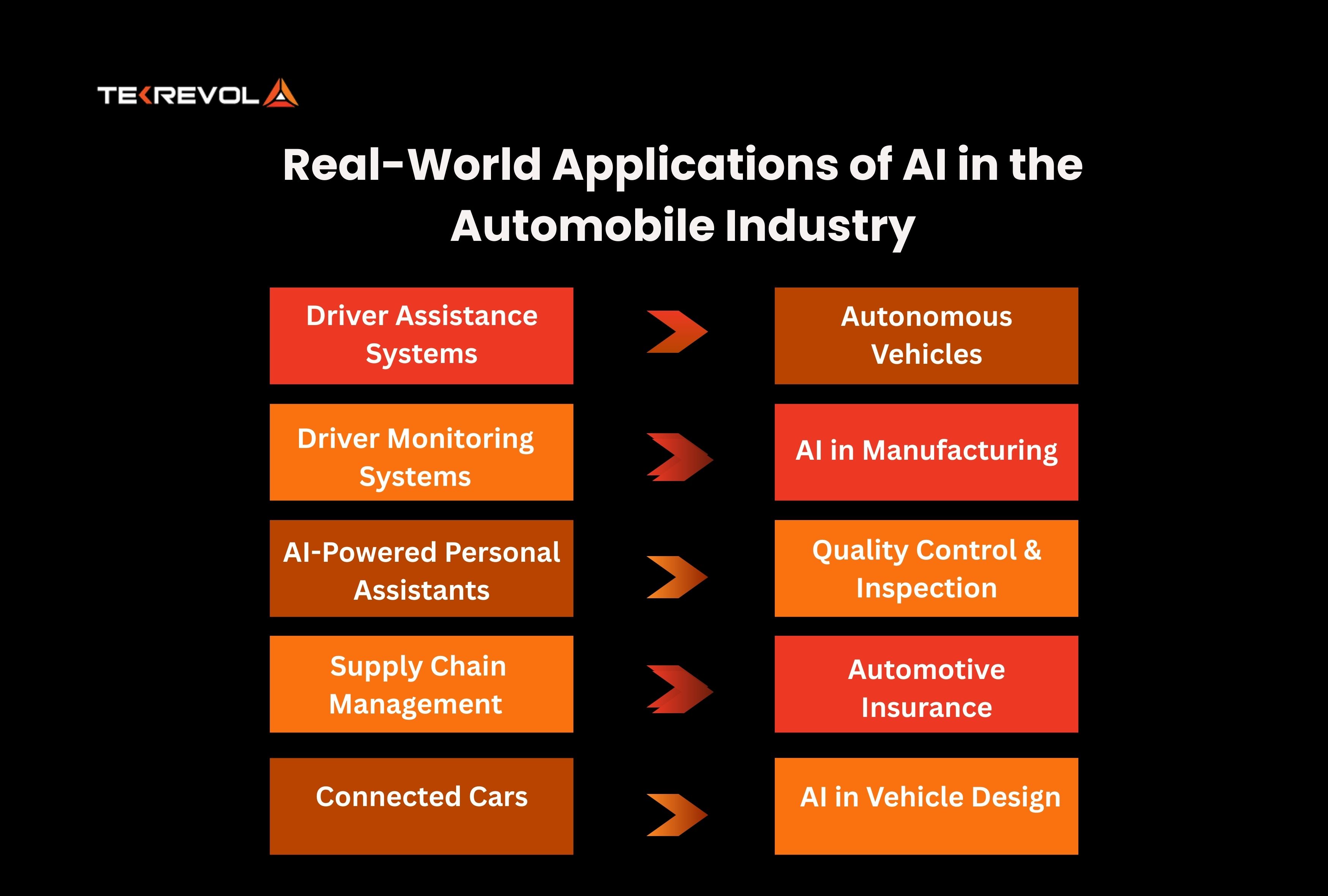
AI is changing the way automotive is produced, making it smarter and efficient. To reduce downtime to enhance quality and sustainability, here is how AI is upgrading the industry:
1. Driver Assistance Systems
Driver assistance systems are one of the greatest benefits of AI in the automotive industry, which enhances safety and comfort during regular driving. These systems lower the probability of various environmental incidents by providing the ability to constantly analyze road conditions.
- Lane departure warning and lane-keeping assist systems can enhance on-road safety by assisting drivers to remain in their lanes and prevent accidents.
- Adaptive cruise control is an instrument that maintains a safe distance between cars.
- The obstacles are read by the emergency braking that is provided by the autopilots, and it is much faster than a human being.
2. Autonomous Vehicles
Artificial Intelligence plays a crucial role in the operation of self-driving cars. AI technology enables cars to navigate safely and manually to reach difficult terrains. These vehicles are built to adapt to their complex surroundings using sensor fusion and cutting-edge AI technology.
- Autonomous Vehicles can survey the surrounding environment in high detail with the help of AI-based cameras, radar, and lidar.
- AI technology also plays an important role in steering and speed control.
- The predictive route planning will lead to less time and energy wastage.
3. Driver Monitoring Systems
Artificial intelligence tracks the behavior and well-being of drivers for security reasons and to prevent collisions. Autopilot can be used to make vehicles watchful of the driver by tracking attention, drowsiness, and other significant signals.
- In-cabin monitoring systems track driver alertness using cameras and sensors.
- Real-time alerts help drivers react quickly and reduce crash risks.
- Adaptive warning systems boost alertness with tactile and sound cues.
4. AI in Manufacturing
AI is evolving car manufacturing by optimizing the process to be leaner, defect-free, and efficient. AI enhances every stage of the manufacturing process in smart factories.
- Predictive maintenance to prevent equipment downtime.
- Computer vision for autonomous quality inspection.
- AI-driven generative design for lightweight, strong, and affordable components.
5. AI-Powered Personal Assistants
In-cars, AI assistants provide drivers and passengers with convenient, hands-free support. The systems enhance comfort, navigation, and driving.
- Voice-activated systems manage routes, temperature, and in-car media.
- Recommendations are customized to match driver behavior and needs.
- Cars connect effortlessly with external devices and cloud services.
6. Quality Control & Inspection
The benefits of AI in the automotive industry also include advanced quality control and inspection, enabling automakers to achieve reliability and greater customer trust.
Computer vision systems that run on artificial intelligence scan each item on the production line and detect defects far more efficiently than the human eye. This will guarantee a smooth flow of only high-quality parts onward, saving on scrap and expensive warranty claims.
- Defects or inaccuracies are automatically detected by automatic inspection systems.
- Ensures quality assurance and enhances the reliability of products.
- Lowers scrap rates and fixed expenses.
7. Supply Chain Management
AI optimizes automobile supply chains to make them more efficient and reduce operational risk. Predictive demand and logistics tracking allow manufacturers to operate more effectively.
- Demand forecasting for raw materials and parts.
- Optimizing inventories to prevent overstock or stockout.
- Monitoring shipments in real-time for faster, more secure delivery.
Check out our guide: Top software solutions driving transformation in manufacturing.
8. Automotive Insurance
AI is upgrading the auto insurance business by enabling personalized policies and proactive risk handling. Insurers are using AI to optimize the precision of their pricing and the experience of their customers.
- Risk analysis using driver behavior, trip information, and vehicle data.
- Predictive analytics-based identification of high-risk drivers and prevention of accidents.
- Claims processing should be automated to enhance client satisfaction and expedite case handling.
9. Connected Cars
Connected cars showcase the benefits of AI in the automotive industry, making driving smarter with infotainment personalization, real-time traffic data, and device integration. ADAS allows them to exchange real-time data with drivers and traffic systems in order to prevent accidents and alleviate congestion.
- Live traffic information and intelligent routing.
- Vehicle-to-vehicle (V2V) and vehicle-to-infrastructure (V2I) connectivity.
- Diagnostic functions and software updates on a remote basis to improve vehicle performance.
10. AI in Vehicle Design
AI accelerates vehicle design with optimized models and prototypes without the requirement for conventional methods. It allows manufacturers to innovate at a reduced cost.
- Generative design takes into account thousands of options for strength, weight, and expense.
- Simulation of performance under various conditions before actual production.
- AI-based ergonomics and design for a better user experience.
AI Is Powering the Next Era of Smarter Automotive Technology
Bring the revolution to your business with our cutting-edge AI automotive solutions.
Learn About Our AI Services!Benefits of AI in the Automotive Industry For Businesses & Consumers
The automotive industry is undergoing a revolution through AI due to the changes in the design of the vehicle, its construction, and driving behaviors. The main benefits of AI in the automotive industry are broken down below:
| For Consumers | For Businesses |
| Improved Safety: ADAS, collision detection, and lane-keeping assist features are designed to decrease accidents. | Optimized Manufacturing: AI-powered robotics and predictive analytics improve quality and efficiency while reducing costs. |
| Predictive Maintenance: Real-time monitoring of the health of the vehicles will prevent breakdowns and reduce the costs of repair. | Fleet & Predictive Maintenance: Fleet monitoring applications powered by AI allow companies to extend the life of machines and reduce downtimes. |
| Personalized Experiences: Voice assistants, infotainment personalization, and emotion recognition create a customized driving experience. | Improved Sales & Customer Experience: AI chatbots, virtual assistants, and CRMs increase conversion rates and customer loyalty. |
| Smarter Navigation: AI uses traffic and weather data to suggest faster, safer routes, saving time and fuel. | Supply Chain Efficiency: AI forecasts demand, optimizes logistics, and reduces inventory issues. |
| Seamless Connectivity: Hands-free voice recognition increases convenience with the least possible distractions. | Data-Driven Innovation: Car manufacturers use AI knowledge to develop improved vehicles, safety options, and mobility solutions. |
AI-powered vehicles are expected to generate $21B in market value by 2030.
Partner with us to integrate advanced AI solutions into your automotive operations and products.
Get Started Now!How Artificial Intelligence is Shaping the Future of Automotive Sales
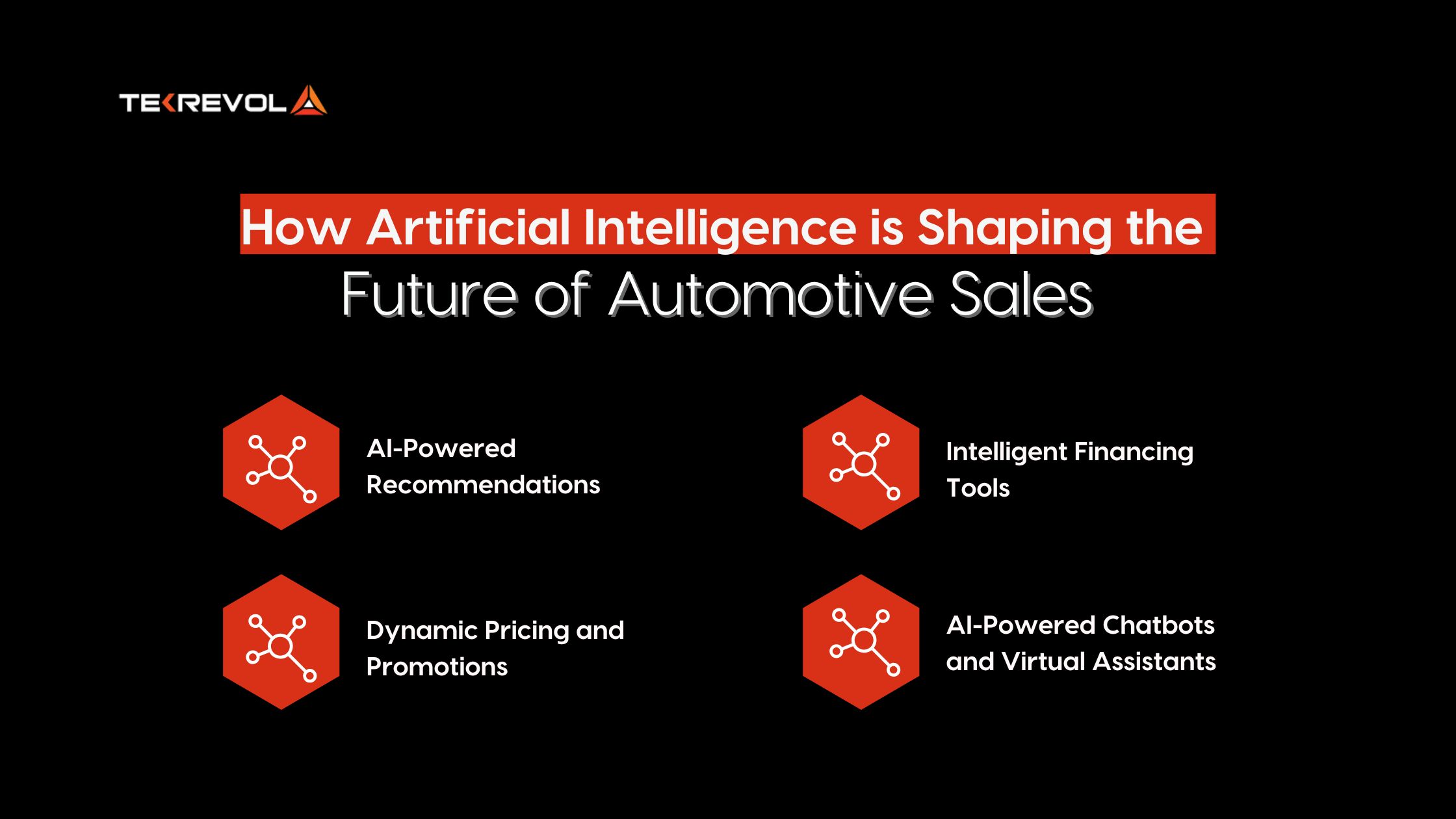
AI is changing how car dealerships do business and interact with customers. The most significant AI-based solutions that are changing the automotive retail industry today are the following:
AI-Powered Recommendations
AI uses customer information, preferences, and patterns of purchases to recommend cars, features, and packages to particular customers.
- Individualized Car Recommendation: Visitors are offered recommendations that will match their lifestyle and previous experience.
- Feature and Accessory Recommendations: AI determines the appropriate additional features or upgrades that a customer might want.
- Greater Customer Interaction: Customized recommendations will increase the chances of conversion..
Intelligent Financing Tools
AI-powered finance tools simplify loan approvals, payments, and car financing, enhancing convenience for the customer.
- Real-Time Credit Evaluation: AI evaluates creditworthiness in real-time to make the right financing options.
- Customized Payment Plans: customized financing plans improve affordability and increase the chances of purchase.
- Efficient Loan Handling: Reduces administrative effort and simplifies the purchasing process.
Dynamic Pricing and Promotions
AI supports dealerships in maximizing pricing and offers as a function of real-time market conditions and demand patterns.
- Real-Time Price Rebalancing: AI computations on competitor pricing and demand trends dynamically rebalance offers.
- Discounts and incentives are personalized: Targeted offers produce the greatest interaction and sale conversions.
- Revenue Maximization: Helps dealerships realize that they can maximize revenue and remain competitive.
AI-Powered Chatbots and Virtual Assistants
Virtual AI assistants and chatbots can offer around-the-clock help, including walking customers through the buying experience until after purchases are made.
- 24/7 Customer Service: Answer questions, make test drive appointments, or talk about the product at the speed of light.
- Fluid Interaction: Conversational AI allows a smoother, natural interaction with potential customers.
- Lead Qualification: Chatbots will do the screening of high-potential leads and pass them on to the sales teams to follow up.
What Are the Main Challenges of Artificial Intelligence in Automotive?
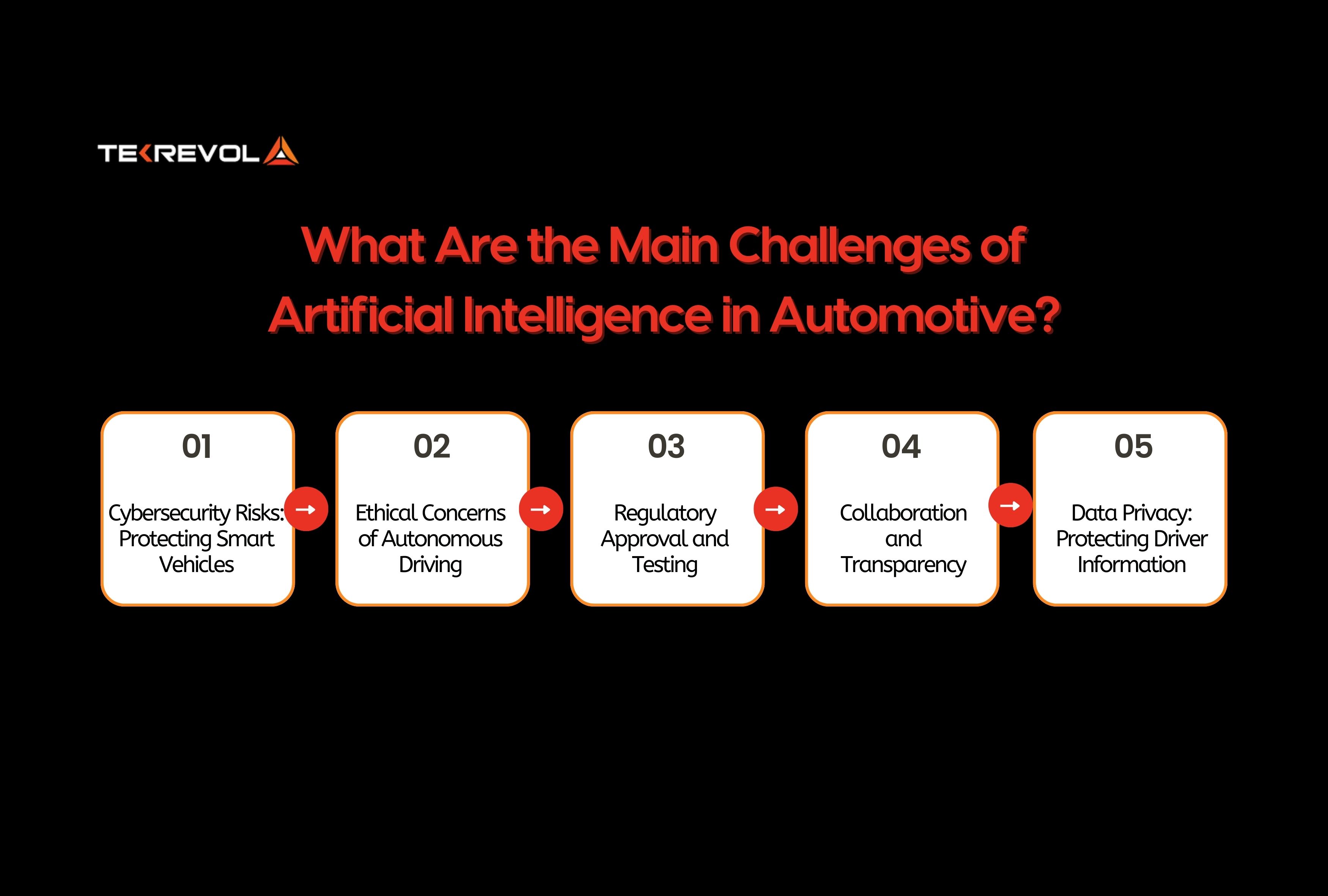
The auto industry is gaining momentum through AI, and its practical use is not necessarily simple. With the increased autonomy and smartness of cars, the safety, security, and trust of individuals should be considered. Here are the most important aspects that must be taken into account by regulators and automakers:
Cybersecurity Risks: Protecting Smart Vehicles
Artificial intelligence cars are gathering and analyzing vast volumes of data, including the location and driving patterns. This exposes them to cyber attacks. In a report, IBM has foreseen that automotive cybersecurity attacks will rise with connected cars becoming the standard, highlighting the need for robust security measures.
Key Strategies:
- Install highly secretive encryption and intrusion detection systems.
- Periodically upgrade software to fix vulnerabilities.
- Eliminate unnecessary data collection to allow safe operation.
Example: Tesla frequently offers software updates and consistently tracks the car system to guarantee data integrity and prevent any security infiltration.
Ethical Concerns of Autonomous Driving
The creation of autonomous driving technology is linked to complicated ethical challenges, particularly when it comes to the matter of liability in the event of an accident. The question of fault is a big one, and it is a matter of whether it belongs to the driver, to the software developer, or to the manufacturer.
The European Parliamentary Research Service (EPRS) states that clear liability frameworks can be key in making autonomous vehicles more accepted by the population. In the absence of such structures, there may be a weakening of the trust and overall acceptance of this technology by the population.
Key Strategies:
- Introduce stringent ethics in AI adoption in cars.
- Have a clear definition of the manufacturer and operator roles and the regulator.
- Provide an overview of the AI decision-making.
Example: Waymo releases comprehensive safety reports about the mechanisms of its AI driving decisions to gain public confidence.
Regulatory Approval and Testing
Before self-driving cars can be introduced on the roads, they will have to undergo rigorous testing and fulfill the criteria set by the government. To make sure that self-driving cars will enter the market earlier and with fewer risks, regulatory and safety standards could be standardized.
Key Strategies:
- Perform a lot of simulations and road testing.
- Adhere to international safety requirements.
- Cooperate with regulatory bodies to make sure that guidelines are followed.
Example: Volvo has collaborated with governmental organizations to test autonomous vehicle safety in restricted settings, in accordance with the regulations to reduce harm to the population.
Collaboration and Transparency
Manufacturers, regulators, and other stakeholders have to address AI challenges together. Transparency regarding AI algorithms and decision-making instills confidence and enables society to embrace the new technologies.
Key Strategies:
- Share information with the general population on how AI systems work.
- Become members of a cross-industry association to come up with safety and ethical standards.
- Inform the customers about the AI potential and the use of data.
Example: BMW engages research bodies and regulators to establish technical and ethical standards of autonomous driving at the industry level.
Data Privacy: Protecting Driver Information
As AI gathers sensitive data, customer data security will be at the top of the priority list. The key to trust building is having transparent policies and control of the data by the user.
Strategic Steps:
- Gather only the data necessary for vehicle operation.
- Implement strict privacy policies and offer user opt-in.
- Use anonymized data for analysis when possible.
Example: Mercedes-Benz provides drivers with the choice to decide what data is transmitted, maintaining transparency and in accordance with privacy regulations such as GDPR.
The Next Era: Future of AI in the Automotive Industry
The AI revolution in the automotive industry is gaining momentum at an insane pace. In the coming ten years, observers of the industry see a paradigm shift in mobility with Connected, Autonomous, Shared, and Electric (CASE) vehicles coming together to change how people and goods move.
- By 2035, all vehicles are expected to be connected, with up to 10% of vehicles potentially featuring Level 4 autonomy.
- Shared autonomous vehicles, such as robotaxis, may account for roughly 15% of urban trips, creating new opportunities in urban mobility.
- Adoption of electric vehicles will continue to increase, driven by AI-optimized battery management and smart charging grids, for improved efficiency and sustainability.
How Leading Automakers Are Powering the Future with AI?
The automotive industry is undergoing a massive evolution, with AI at the center of it. To develop vehicles capable of thinking, learning, and adapting, instead of just using traditional engineering alone, the most successful carmakers are integrating sophisticated algorithms with hardware invention.
The following are the leading companies that are pushing this AI transformation along:
| Company | AI Focus Area | Key Innovation |
| Tesla | Autonomous Driving & Smart Systems | Autopilot and Full Self-Driving with fleet learning |
| BMW | In-Car Intelligence & Safety | Intelligent Personal Assistant and predictive maintenance |
| Nvidia | AI Computing & Autonomous Platforms | DRIVE platform powering self-driving cars |
| Waymo | Autonomous Ride-Hailing | AI-powered driverless fleets and perception systems |
Partner with TekRevol to Embrace AI in Your Automotive Business
As you now recognize the benefits of AI in the automotive industry, it is time for industry leaders to adopt AI tactics that enable innovation and establish a competitive edge in today’s marketplace.
For automakers and mobility providers, the question isn’t whether to adopt AI, but how to implement it effectively to stay competitive.
TekRevol’s RevAI offers cutting-edge AI solutions customized for the automotive sector. As a leading AI development company, we offer end-to-end AI solutions that enable innovation every step of the way, with each project customized to business goals, creating measurable ROI, and meeting compliance mandates.
Whether you require an AI vision system to suit your production line, a deep-learning model for autonomous driving assistants, or a data platform for connected-car services, RevAI possesses the vision and experience to bring your AI projects to life. With TekRevol, you get a dedicated team of AI experts who understand both automotive challenges and AI opportunities.
Accelerate Your Automotive AI Strategy Today
We help you build custom AI solutions and implementation strategies for automotive transformation
Get Your Free AI Roadmap
